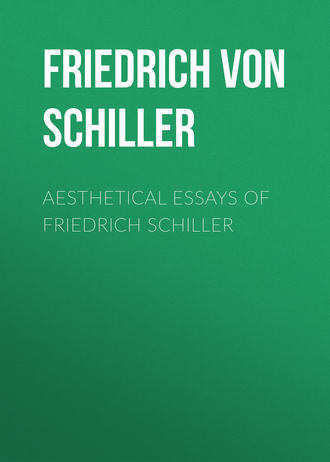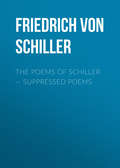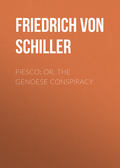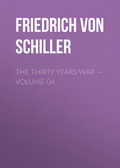
Фридрих Шиллер
Aesthetical Essays of Friedrich Schiller
LETTER XVIII
By beauty the sensuous man is led to form and to thought; by beauty the spiritual man is brought back to matter and restored to the world of sense.
From this statement it would appear to follow that between matter and form, between passivity and activity, there must be a middle state, and that beauty plants us in this state. It actually happens that the greater part of mankind really form this conception of beauty as soon as they begin to reflect on its operations, and all experience seems to point to this conclusion. But, on the other hand, nothing is more unwarrantable and contradictory than such a conception, because the aversion of matter and form, the passive and the active, feeling and thought, is eternal, and cannot be mediated in any way. How can we remove this contradiction? Beauty weds the two opposed conditions of feeling and thinking, and yet there is absolutely no medium between them. The former is immediately certain through experience, the other through the reason.
This is the point to which the whole question of beauty leads, and if we succeed in settling this point in a satisfactory way, we have at length found the clue that will conduct us through the whole labyrinth of aesthetics.
But this requires two very different operations, which must necessarily support each other in this inquiry. Beauty, it is said, weds two conditions with one another which are opposite to each other, and can never be one. We must start from this opposition; we must grasp and recognize them in their entire purity and strictness, so that both conditions are separated in the most definite manner; otherwise we mix, but we do not unite them. Secondly, it is usual to say, beauty unites those two opposed conditions, and therefore removes the opposition. But because both conditions remain eternally opposed to one another, they cannot be united in any other way than by being suppressed. Our second business is therefore to make this connection perfect, to carry them out with such purity and perfection that both conditions disappear entirely in a third one, and no trace of separation remains in the whole; otherwise we segregate, but do not unite. All the disputes that have ever prevailed and still prevail in the philosophical world respecting the conception of beauty have no other origin than their commencing without a sufficiently strict distinction, or that it is not carried out fully to a pure union. Those philosophers who blindly follow their feeling in reflecting on this topic can obtain no other conception of beauty, because they distinguish nothing separate in the totality of the sensuous impression. Other philosophers, who take the understanding as their exclusive guide, can never obtain a conception of beauty, because they never see anything else in the whole than the parts; and spirit and matter remain eternally separate, even in their most perfect unity. The first fear to suppress beauty dynamically, that is, as a working power, if they must separate what is united in the feeling. The others fear to suppress beauty logically, that is, as a conception, when they have to hold together what in the understanding is separate. The former wish to think of beauty as it works; the latter wish it to work as it is thought. Both therefore must miss the truth; the former, because they try to follow infinite nature with their limited thinking power; the others, because they wish to limit unlimited nature according to their laws of thought. The first fear to rob beauty of its freedom by a too strict dissection, the others fear to destroy the distinctness of the conception by a too violent union. But the former do not reflect that the freedom in which they very properly place the essence of beauty is not lawlessness, but harmony of laws; not caprice, but the highest internal necessity. The others do not remember that distinctness, which they with equal right demand from beauty, does not consist in the exclusion of certain realities, but the absolute including of all; that is not therefore limitation but infinitude. We shall avoid the quicksands on which both have made shipwreck if we begin from the two elements in which beauty divides itself before the understanding, but then afterwards rise to a pure aesthetic unity by which it works on feeling, and in which both those conditions completely disappear.
LETTER XIX
Two principal and different states of passive and active capacity of being determined [Bestimmbarkeit] can be distinguished in man; in like manner two states of passive and active determination [Bestimmung]. The explanation of this proposition leads us most readily to our end.
The condition of the state of man before destination or direction is given him by the impression of the senses is an unlimited capacity of being determined. The infinite of time and space is given to his imagination for its free use; and, because nothing is settled in this kingdom of the possible, and therefore nothing is excluded from it, this state of absence of determination can be named an empty infiniteness, which must not by any means be confounded with an infinite void.
Now it is necessary that his sensuous nature should be modified, and that in the indefinite series of possible determinations one alone should become real. One perception must spring up in it. That which, in the previous state of determinableness, was only an empty potency becomes now an active force, and receives contents; but, at the same time, as an active force it receives a limit, after having been, as a simple power, unlimited. Reality exists now, but the infinite has disappeared. To describe a figure in space, we are obliged to limit infinite space; to represent to ourselves a change in time, we are obliged to divide the totality of time. Thus we only arrive at reality by limitation, at the positive, at a real position, by negation or exclusion; to determination, by the suppression of our free determinableness.
But mere exclusion would never beget a reality, nor would a mere sensuous impression ever give birth to a perception, if there were not something from which it was excluded, if by an absolute act of the mind the negation were not referred to something positive, and if opposition did not issue out of non-position. This act of the mind is styled judging or thinking, and the result is named thought.
Before we determine a place in space, there is no space for us; but without absolute space we could never determine a place. The same is the case with time. Before we have an instant, there is no time to us: but without infinite time – eternity – we should never have a representation of the instant. Thus, therefore, we can only arrive at the whole by the part, to the unlimited through limitation; but reciprocally we only arrive at the part through the whole, at limitation through the unlimited.
It follows from this, that when it is affirmed of beauty that it mediates for man, the transition from feeling to thought, this must not be understood to mean that beauty can fill up the gap that separates feeling from thought, the passive from the active. This gap is infinite; and, without the interposition of a new and independent faculty, it is impossible for the general to issue from the individual, the necessary from the contingent. Thought is the immediate act of this absolute power, which, I admit, can only be manifested in connection with sensuous impressions, but which in this manifestation depends so little on the sensuous that it reveals itself specially in an opposition to it. The spontaneity or autonomy with which it acts excludes every foreign influence; and it is not in as far as it helps thought – which comprehends a manifest contradiction but only in as far as it procures for the intellectual faculties the freedom to manifest themselves in conformity with their proper laws. It does it only because the beautiful can become a means of leading man from matter to form, from feeling to laws, from a limited existence to an absolute existence.
But this assumes that the freedom of the intellectual faculties can be balked, which appears contradictory to the conception of an autonomous power. For a power which only receives the matter of its activity from without can only be hindered in its action by the privation of this matter, and consequently by way of negation; it is therefore a misconception of the nature of the mind to attribute to the sensuous passions the power of oppressing positively the freedom of the mind. Experience does indeed present numerous examples where the rational forces appear compressed in proportion to the violence of the sensuous forces. But instead of deducing this spiritual weakness from the energy of passion, this passionate energy must rather be explained by the weakness of the human mind. For the sense can only have a sway such as this over man when the mind has spontaneously neglected to assert its power.
Yet in trying by these explanations to move one objection, I appear to have exposed myself to another, and I have only saved the autonomy of the mind at the cost of its unity. For how can the mind derive at the same time from itself the principles of inactivity and of activity, if it is not itself divided, and if it is not in opposition with itself?
Here we must remember that we have before us, not the infinite mind, but the finite. The finite mind is that which only becomes active through the passive, only arrives at the absolute through limitation, and only acts and fashions in as far as it receives matter. Accordingly, a mind of this nature must associate with the impulse towards form or the absolute, an impulse towards matter or limitation, conditions without which it could not have the former impulse nor satisfy it. How can two such opposite tendencies exist together in the same being? This is a problem that can no doubt embarrass the metaphysician, but not the transcendental philosopher. The latter does not presume to explain the possibility of things, but he is satisfied with giving a solid basis to the knowledge that makes us understand the possibility of experience. And as experience would be equally impossible without this autonomy in the mind, and without the absolute unity of the mind, it lays down these two conceptions as two conditions of experience equally necessary without troubling itself any more to reconcile them. Moreover, this immanence of two fundamental impulses does not in any degree contradict the absolute unity of the mind, as soon as the mind itself, its selfhood, is distinguished from those two motors. No doubt, these two impulses exist and act in it, but itself is neither matter nor form, nor the sensuous nor reason, and this is a point that does not seem always to have occurred to those who only look upon the mind as itself acting when its acts are in harmony with reason, and who declare it passive when its acts contradict reason.
Arrived at its development, each of these two fundamental impulsions tends of necessity and by its nature to satisfy itself; but precisely because each of them has a necessary tendency, and both nevertheless have an opposite tendency, this twofold constraint mutually destroys itself, and the will preserves an entire freedom between them both. It is therefore the will that conducts itself like a power – as the basis of reality – with respect to both these impulses; but neither of them can by itself act as a power with respect to the other. A violent man, by his positive tendency to justice, which never fails in him, is turned away from injustice; nor can a temptation of pleasure, however strong, make a strong character violate its principles. There is in man no other power than his will; and death alone, which destroys man, or some privation of self-consciousness, is the only thing that can rob man of his internal freedom.
An external necessity determines our condition, our existence in time, by means of the sensuous. The latter is quite involuntary, and directly it is produced in us we are necessarily passive. In the same manner an internal necessity awakens our personality in connection with sensations, and by its antagonism with them; for consciousness cannot depend on the will, which presupposes it. This primitive manifestation of personality is no more a merit to us than its privation is a defect in us. Reason can only be required in a being who is self-conscious, for reason is an absolute consecutiveness and universality of consciousness; before this is the case he is not a man, nor can any act of humanity be expected from him. The metaphysician can no more explain the limitation imposed by sensation on a free and autonomous mind than the natural philosopher can understand the infinite, which is revealed in consciousness in connection with these limits. Neither abstraction nor experience can bring us back to the source whence issue our ideas of necessity and of universality: this source is concealed in its origin in time from the observer, and its super-sensuous origin from the researches of the metaphysician. But, to sum up in a few words, consciousness is there, and, together with its immutable unity, the law of all that is for man is established, as well as of all that is to be by man, for his understanding and his activity. The ideas of truth and of right present themselves inevitable, incorruptible, immeasurable, even in the age of sensuousness; and without our being able to say why or how, we see eternity in time, the necessary following the contingent. It is thus that, without any share on the part of the subject, the sensation and self-consciousness arise, and the origin of both is beyond our volition, as it is out of the sphere of our knowledge.
But as soon as these two faculties have passed into action, and man has verified by his experience, through the medium of sensation, a determinate existence, and through the medium of consciousness its absolute existence, the two fundamental impulses exert their influence directly their object is given. The sensuous impulse is awakened with the experience of life – with the beginning of the individual; the rational impulsion with the experience of law – with the beginning of his personality; and it is only when these two inclinations have come into existence that the human type is realized. Up to that time, everything takes place in man according to the law of necessity; but now the hand of nature lets him go, and it is for him to keep upright humanity, which nature places as a germ in his heart. And thus we see that directly the two opposite and fundamental impulses exercise their influence in him, both lose their constraint, and the autonomy of two necessities gives birth to freedom.
LETTER XX
That freedom is an active and not a passive principle results from its very conception; but that liberty itself should be an effect of nature (taking this word in its widest sense), and not the work of man, and therefore that it can be favored or thwarted by natural means, is the necessary consequence of that which precedes. It begins only when man is complete, and when these two fundamental impulsions have been developed. It will then be wanting whilst he is incomplete, and while one of these impulsions is excluded, and it will be re-established by all that gives back to man his integrity.
Thus it is possible, both with regard to the entire species as to the individual, to remark the moment when man is yet incomplete, and when one of the two exclusions acts solely in him. We know that man commences by life simply, to end by form; that he is more of an individual than a person, and that he starts from the limited or finite to approach the infinite. The sensuous impulsion comes into play therefore before the rational impulsion, because sensation precedes consciousness; and in this priority of sensuous impulsion we find the key of the history of the whole of human liberty.
There is a moment, in fact, when the instinct of life, not yet opposed to the instinct of form, acts as nature and as necessity; when the sensuous is a power because man has not begun; for even in man there can be no other power than his will. But when man shall have attained to the power of thought, reason, on the contrary, will be a power, and moral or logical necessity will take the place of physical necessity. Sensuous power must then be annihilated before the law which must govern it can be established. It is not enough that something shall begin which as yet was not; previously something must end which had begun. Man cannot pass immediately from sensuousness to thought. He must step backwards, for it is only when one determination is suppressed that the contrary determination can take place. Consequently, in order to exchange passive against active liberty, a passive determination against an active, he must be momentarily free from all determination, and must traverse a state of pure determinability. He has then to return in some degree to that state of pure negative indetermination in which he was before his senses were affected by anything. But this state was absolutely empty of all contents, and now the question is to reconcile an equal determination and a determinability equally without limit, with the greatest possible fulness, because from this situation something positive must immediately follow. The determination which man received by sensation must be preserved, because he should not lose the reality; but at the same time, in so far as finite, it should be suppressed, because a determinability without limit would take place. The problem consists then in annihilating the determination of the mode of existence, and yet at the same time in preserving it, which is only possible in one way: in opposing to it another. The two sides of a balance are in equilibrium when empty; they are also in equilibrium when their contents are of equal weight.
Thus, to pass from sensation to thought, the soul traverses a medium position, in which sensibility and reason are at the same time active, and thus they mutually destroy their determinant power, and by their antagonism produce a negation. This medium situation in which the soul is neither physically nor morally constrained, and yet is in both ways active, merits essentially the name of a free situation; and if we call the state of sensuous determination physical, and the state of rational determination logical or moral, that state of real and active determination should be called the aesthetic.
LETTER XXI
I have remarked in the beginning of the foregoing letter that there is a twofold condition of determinableness and a twofold condition of determination. And now I can clear up this proposition.
The mind can be determined – is determinable – only in as far as it is not determined; it is, however, determinable also, in as far as it is not exclusively determined; that is, if it is not confined in its determination. The former is only a want of determination – it is without limits, because it is without reality; but the latter, the aesthetic determinableness, has no limits, because it unites all reality.
The mind is determined, inasmuch as it is only limited; but it is also determined because it limits itself of its own absolute capacity. It is situated in the former position when it feels, in the second when it thinks. Accordingly the aesthetic constitution is in relation to determinableness what thought is in relation to determination. The latter is a negative from internal and infinite completeness, the former a limitation from internal infinite power. Feeling and thought come into contact in one single point, the mind is determined in both conditions, the man becomes something and exists – either as individual or person – by exclusion; in other cases these two faculties stand infinitely apart. Just in the same manner the aesthetic determinableness comes in contact with the mere want of determination in a single point, by both excluding every distinct determined existence, by thus being in all other points nothing and all, and hence by being infinitely different. Therefore if the latter, in the absence of determination from deficiency, is represented as an empty infiniteness, the aesthetic freedom of determination, which forms the proper counterpart to the former, can be considered as a completed infiniteness; a representation which exactly agrees with the teachings of the previous investigations.
Man is therefore nothing in the aesthetic state, if attention is given to the single result, and not to the whole faculty, and if we regard only the absence or want of every special determination. We must therefore do justice to those who pronounce the beautiful, and the disposition in which it places the mind, as entirely indifferent and unprofitable, in relation to knowledge and feeling. They are perfectly right; for it is certain that beauty gives no separate, single result, either for the understanding or for the will; it does not carry out a single intellectual or moral object; it discovers no truth, does not help us to fulfil a single duty, and, in one word, is equally unfit to found the character or to clear the head. Accordingly, the personal worth of a man, or his dignity, as far as this can only depend on himself, remains entirely undetermined by aesthetic culture, and nothing further is attained than that, on the part of nature, it is made profitable for him to make of himself what he will; that the freedom to be what he ought to be is restored perfectly to him.
But by this something infinite is attained. But as soon as we remember that freedom is taken from man by the one-sided compulsion of nature in feeling, and by the exclusive legislation of the reason in thinking, we must consider the capacity restored to him by the aesthetical disposition, as the highest of all gifts, as the gift of humanity. I admit that he possesses this capacity for humanity, before every definite determination in which he may be placed. But, as a matter of fact, he loses it with every determined condition into which he may come; and if he is to pass over to an opposite condition, humanity must be in every case restored to him by the aesthetic life.
It is therefore not only a poetical license, but also philosophically correct, when beauty is named our second creator. Nor is this inconsistent with the fact that she only makes it possible for us to attain and realize humanity, leaving this to our free will. For in this she acts in common with our original creator, nature, which has imparted to us nothing further than this capacity for humanity, but leaves the use of it to our own determination of will.





